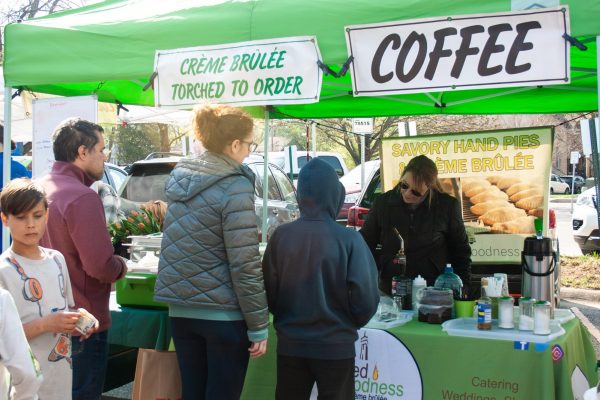A Different Perspective on Free State Culinary Courses
The focus of culinary courses has shifted toward careers in food services.
The smells of baked goods and desserts waft through the air as students wander past culinary teacher Kerri Hess’s classroom, a place that many speculate to be filled to the brim with incessant snacking and leisurely times. While that is not the whole story of the culinary department, Hess admits that her class is not as rigorous as some other courses at the high school.
“… [The courses are] not meant to be too easy, and [they are] not meant to be too hard,” Hess said.
Although the culinary courses are traditionally not as challenging, Hess can attest to the value of a foods course on a pragmatic level.
“They [the dishes] are definitely more practical, especially in Culinary Essentials…,” Hess said, “you have a basic recipe to follow … you have to know how to measure and which [tools] to use.”
Culinary Essentials, the first food-related course any student can take, is a beginner course that equips participants with the necessary skills to begin cooking. This course not only requires that students attain a basic aptitude in the realm of food preparation, but also gain an understanding of basic nutrition science and food service careers.
Hess’s students also learn communication skills. “If you aren’t communicating with your kitchen members, somebody could mess up measurements or put in the wrong ingredient,” sophomore Meghan McClorey said. “Communication is very important and following directions is really important.”
While Hess considers all of these lessons to be important, she considers a simple appreciation of food to be the most valuable thing she can bestow upon her students.
“Hopefully what I am imparting in the culinary classes is a love of making good food, whether it is for themselves or for their family,” Hess said.
Students certainly do enjoy the making the meals Hess assigns in the classes, and, with time, develop favorite recipes to prepare.
“I liked making potato soup,” freshman Camille Brown said.
Over time, however, the focus of family and consumer science classes has shifted. The courses were initially intended to teach skills that would be useful in a practical sense throughout life, but in the early 21st century, the curriculum assumed a new objective.
“This class was originally taught to give people the background to be able to feed their family,” Hess said. “It is not so much focused on that anymore; our focus is now on the career.”
In culinary class, students flip through the Occupational Outlook Handbook, a government-issued resource, to gain knowledge about various foodservice vocations. The class serves as both a useful opportunity to gain fundamental cooking skills and as a type of preliminary vocational education course. This change is part of a broader movement to increase the emphasis on career options that do not require college education.
“The outlook now for Lawrence Public Schools is that not everyone is going to go to college,” Hess said. “With career and technical education, [there] are ways that people can educate themselves without going to a four-year college.”
While there exists the perception that culinary courses are just for kids who are reluctant to take a more challenging elective, it cannot be denied that kids who take the class, regardless of their intentions, end up gaining valuable knowledge about many food related careers. In addition, students develop skills that can be utilized in all aspects of life, such as the importance of working together.
“If you aren’t communicating with your kitchen members, somebody could mess up measurements or put in the wrong ingredient,” sophomore Meghan McClorey said. “Communication is very important and following directions is really important.”
Some students come in with a set idea of culinary as a field that only involves cooking, but Hess assures that the field is much more diverse.
“They don’t have to become a chef,” Hess said. “There is event management and planning… there is beverage management… there are a lot of avenues that they can pursue besides aiming to be a chef.”
While an aspiring chef can use the course to hone his or her abilities, another individual may find a career path that suits him or herself perfectly, and an inexperienced student can gain knowledge of basic food preparation. Regardless of the student’s aims, he or she can be confident that the culinary course will behoove him or her in some aspect of life.
“I tell my students that whatever we learn in this class, we can take right out that classroom door, and they can use it,” Hess said.
Your donation will support the student journalists of Lawrence Free State High School. Your contribution will allow us to purchase equipment and cover our annual website hosting costs.






